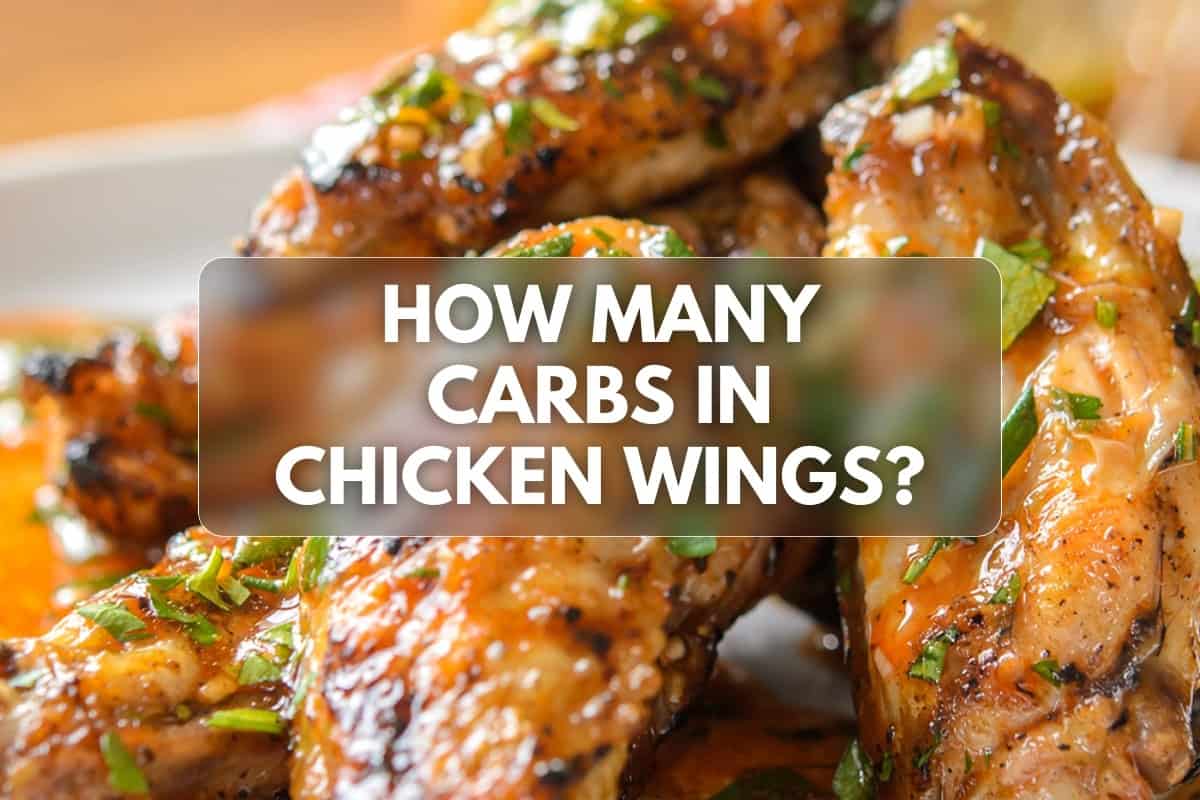Ever found yourself staring at a plate of delicious fried chicken wings while trying to count macros? You’re not alone! As someone who’s both a wing enthusiast and health-conscious eater, I’ve spent way too much time researching this very question. Let’s dive into the tasty (and sometimes surprising) world of chicken wing carbohydrates.
The Quick Answer: Carb Content Varies Dramatically
The short answer? Plain fried chicken wings with no breading contain very few carbs (less than 1 gram per wing), but breaded and sauced wings can contain significantly more—anywhere from 5 to over 40 grams per serving depending on preparation.
But there’s so much more to the story! Let’s break it down further.
Understanding Chicken Wing Carb Content
The carbohydrate content in fried chicken wings depends on several key factors
- Whether they’re breaded or unbreaded
- What type of sauce or coating is used
- The cooking method
- The size of the wings
Let’s explore each of these factors in detail,
Plain vs. Breaded: The Biggest Carb Difference
Here’s where we see the most dramatic difference in carb content:
Plain Fried Chicken Wings (No Breading)
According to nutrition data from FatSecret and Chef’s Resource, plain chicken wings with the skin (but no breading) contain essentially zero carbs. That’s right—the chicken meat and skin itself has virtually no carbohydrates! This makes plain wings a surprisingly keto-friendly option.
Breaded Fried Chicken WingsOnce you add breading the carb count increases significantly. According to Carb Manager, a single breaded fried chicken wing contains about 0.4-0.5g net carbs per unit (based on yield from 1 lb ready-to-cook chicken). However larger wings with heavier breading can contain much more.
Restaurant-style breaded wings typically have anywhere from 5g to over 10g of carbs per wing, depending on the thickness of the breading and the size of the wing.
The Sauce Factor: Hidden Carb Sources
Many people forget that sauces add significant carbs to wings. Here’s how common wing sauces stack up:
| Sauce Type | Approximate Carbs per 2 Tbsp |
|---|---|
| Buffalo (traditional) | 1-2g |
| BBQ Sauce | 8-12g |
| Honey Garlic | 10-15g |
| Teriyaki | 8-14g |
| Sweet Chili | 12-18g |
| Dry Rub (typical) | 1-3g |
Traditional buffalo sauce (made primarily with hot sauce and butter) is typically low in carbs, which is why buffalo wings can still be relatively low-carb options even when they’re sauced. But sweet sauces like honey garlic or BBQ can add a ton of hidden carbs!
Cooking Methods: Impact on Carb Content
While the cooking method itself doesn’t directly add carbohydrates, it can affect how much breading adheres to the wings and how much sauce is absorbed.
Here’s an interesting tidbit: wings fried at lower temperatures might absorb more oil and breading than those fried at high temperatures, potentially increasing their carb content slightly. But this effect is minimal compared to the breading and sauce choices.
Real-World Examples: Carbs in Common Wing Styles
Let’s look at some real-world examples of carb counts in common wing preparations:
Restaurant Wings
According to various nutritional databases and restaurant information:
- Plain wings (unbreaded): 0g carbs per wing
- Traditional buffalo wings (unbreaded): 0-1g carbs per wing
- Lightly breaded wings: 2-5g carbs per wing
- Heavily breaded wings: 5-10g carbs per wing
- Breaded wings with sweet sauce: 8-15g carbs per wing
Total Carbs in a Typical Serving
A typical restaurant serving of wings (8-10 pieces) could range from:
- 0g carbs (plain, unbreaded wings)
- Up to 40-50g carbs (heavily breaded with sweet sauce)
That’s a huge difference! This explains why it’s so important to know exactly how your wings are prepared if you’re counting carbs.
FAQs About Chicken Wing Carbs
Are chicken wings keto-friendly?
Plain, unbreaded chicken wings are extremely keto-friendly, containing almost no carbs and plenty of fat and protein. Even with traditional buffalo sauce, they can fit into a keto diet. However, breaded wings or wings with sweet sauces are generally not keto-compatible.
Which fast food chain has the lowest carb chicken wings?
Many chains offer unbreaded wing options. Traditional buffalo wings from most restaurants are relatively low in carbs if they’re not breaded. Always ask if they’re breaded before ordering if you’re watching carbs.
Can I make low-carb fried chicken wings at home?
Absolutely! You can make delicious low-carb wings by:
- Skipping the breading entirely
- Using low-carb breading alternatives like almond flour, coconut flour, or crushed pork rinds
- Making your own sauces using low-carb sweeteners instead of sugar
- Using dry rubs made primarily of spices rather than sweet sauces
How can I estimate carbs in restaurant wings if nutritional info isn’t available?
If you’re at a restaurant without nutritional information, here are some tips:
- Ask if the wings are breaded or unbreaded
- Inquire about the sauce ingredients (especially if it tastes sweet)
- When in doubt, order plain wings with sauce on the side so you can control the amount
- Estimate about 5-10g carbs per breaded wing and add more if there’s sweet sauce
Making Smarter Wing Choices
If you’re watching your carb intake but still want to enjoy chicken wings, here are some tips:
- Go naked: Choose unbreaded wings whenever possible
- Sauce on the side: Ask for sauces on the side so you can control the amount
- Choose wisely: Opt for traditional buffalo, dry rubs, or garlic parmesan instead of sweet sauces
- Mind the portion: A typical serving of 10 wings can vary from 0g to 50g+ of carbs depending on preparation
- DIY: Make your own wings at home where you can control the ingredients
The Bottom Line
Chicken wings can range from being virtually carb-free to quite carb-heavy depending on how they’re prepared. The main factors that determine carb content are:
- Breading: The biggest factor—no breading means almost no carbs
- Sauce: Sweet sauces add significant carbs
- Preparation method: Affects how much breading and sauce adheres to the wings
- Size: Larger wings have more surface area for breading and sauce
By understanding these factors, you can make informed choices about your wing consumption that align with your dietary goals. Whether you’re following keto, low-carb, or just being mindful of your macros, you can still enjoy this popular food with the right approach.
I personally love making my own wings at home using an air fryer—no breading needed, and I can control exactly what goes on them. My favorite low-carb option is a spicy dry rub with a side of blue cheese dressing!
So next time you’re facing down a plate of wings, you’ll know exactly what you’re getting into carb-wise. Happy wing eating!

Tips for Lowering Carbs in Chicken Wings
When enjoying chicken wings on a low-carb or keto diet, these tips can help you keep your carb intake in check:
- Opt for grilled, baked, or air-fried wings without breading to minimize carb content.
- Use sauces like Buffalo, garlic Parmesan, or lemon pepper that are lower in carbs and sugar. Look for sugar-free or reduced-sugar versions of BBQ or teriyaki sauces to limit carb intake.
- Skip breaded wings, as they significantly increase carb content. Instead, season wings with dry rubs made from herbs, spices, and a touch of salt, which add flavor without carbs. Avoid marinades high in sugars or starches to maintain a low-carb profile.
Nutritional Information of Chicken Wings
Chicken wings have a fantastic nutritional profile, making them a great low-carb diet option. Let’s break down the macronutrients and other key details for one small wing (yield after cooking, bone removed):
| Quantity | 1 small wing (30 g) |
| Calories | 86.4 kcal |
| Total Carbs | 0g |
| Protein | 8g |
| Fat | 5.8 g |
| Saturated Fat | 1.6 g |
| Calcium | 4.5mg |
| Iron | 0.4 mg |
BUILDING A LOW CARB COMMUNITY

STRONGER WITH SUPPORT
I thought this journey could be done alone. I thought I was strong enough to maintain the weight loss for the rest of my life.
I was wrong.
Subscribe below and keep in touch. Join the conversation. I’m here to support your journey too.
Here are the only updates I’ll ever send: New Recipes with Low-Carb Tips. That’s it. For updates on my Journey, expanding community etc… please visit my subscriptions page.
Unsubscribe at anytime from anything I send. Name Email
One small chicken wing, with the bone removed, weighs about 30 grams and contains 86.4 kcal. The chicken wing calories makes them a satisfying snack or meal addition without breaking your daily calorie bank. The caloric content mainly comes from protein and fat, providing sustained energy. So, you can enjoy a few wings without worrying too much about the calorie load.
Chicken wings are a perfect fit for low-carb and keto diets because there are zero-gram carbs in chicken wings. This means you can enjoy their savory goodness without impacting your carb count for the day. By keeping your wings plain or using low-carb seasonings and sauces, you can maintain their carb-free status. It’s a delicious way to stick to your low-carb goals.
Each small chicken wing packs in about 8 grams of protein, making them a great source of this essential macronutrient. Protein is crucial for muscle repair, growth, and overall body function. Including chicken wings in your diet helps you meet your protein needs while enjoying a tasty treat. Plus, the protein content helps keep you full and satisfied.
Chicken wings contain 5.8 grams of fat per small wing, including 1.6 grams of saturated fat. This fat content contributes to their rich flavor and satisfying texture. Fat is also a vital macronutrient that provides energy and supports various bodily functions. For those on a low-carb or keto diet, the higher fat content of wings helps meet dietary fat requirements.
While chicken wings aren’t a major source of vitamins and minerals, they do provide small amounts of calcium and iron. Each small wing contains about 4.5 mg of calcium and 0.4 mg of iron. Calcium is important for bone health, and iron is essential for oxygen transport in the blood. These nutrients, though minimal, contribute to the overall nutritional value of chicken wings.

